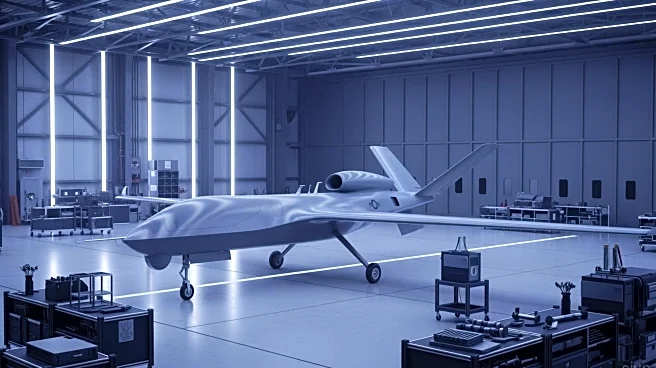What's Happening?
General Atomics Aeronautical Systems, Inc. (GA-ASI) has entered into a partnership with South Korean company Hanwha Aerospace to co-develop the Gray Eagle Short Takeoff and Landing (GE STOL) unmanned aircraft system (UAS). This collaboration marks a significant
step in U.S.-Korea defense cooperation, aiming to deliver advanced, runway-independent UAS solutions. The agreement includes co-development and co-production efforts, with the maiden flight scheduled for 2027 and first customer deliveries in 2028. GA-ASI will manage final integration, while Hanwha will establish a production facility in South Korea for assembly and manufacturing. The GE STOL is designed to operate from semi-improved surfaces, enhancing its operational flexibility for various missions, including Reconnaissance, Surveillance, and Target Acquisition (RSTA).
Why It's Important?
The partnership between GA-ASI and Hanwha Aerospace is poised to significantly impact the global defense industry by introducing a versatile UAS capable of operating in diverse environments. This development is crucial for military commanders seeking adaptable solutions to evolving mission demands. The collaboration also highlights the strategic investment in UAS technology, aiming to reduce risk and lifecycle costs through international cost-sharing. By producing the GE STOL in both South Korea and the U.S., the initiative is expected to create jobs and foster the domestic UAS industry ecosystem in Korea, while enhancing GA-ASI's production capabilities in the U.S.
What's Next?
The next steps involve the design and production of a representative GE STOL model, with ongoing collaboration between GA-ASI and Hanwha Aerospace. The companies plan to leverage their expertise to accelerate the development and delivery of the UAS to global customers, including the South Korea Ministry of Defense and the United States War Department. As the project progresses, stakeholders in the defense industry will likely monitor its impact on operational capabilities and cost efficiencies. The successful implementation of this partnership could lead to further collaborations in the defense sector, enhancing U.S.-Korea relations and technological advancements.
Beyond the Headlines
The collaboration between GA-ASI and Hanwha Aerospace may influence broader geopolitical dynamics, as it strengthens defense ties between the U.S. and South Korea. This partnership could serve as a model for future international defense collaborations, emphasizing the importance of shared technological investments and capabilities. Additionally, the focus on runway-independent UAS solutions reflects a shift towards more flexible and adaptable military technologies, potentially reshaping strategic approaches to defense operations.
















